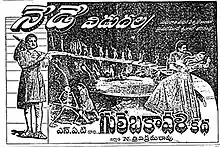Gulebakavali Katha
Gulebakavali Katha (transl. The story of Gulebakavali) is a 1962 Indian Telugu-language fantasy swashbuckler film produced by N. Trivikrama Rao and directed by N. T. Rama Rao. It is based on the story of Gulebakavali from the tale collection Kasi Majilee Kathalu by Madhira Subbanna Deekshitulu. Rama Rao also stars as the male lead, alongside Jamuna and Nagarathna as the female leads. The film focuses on a man's quest to search for the Gulebakavali flower, which he needs to cure the king's blindness. It was released on 5 January 1962, and became a commercial success.
| Gulebakavali Katha | |
|---|---|
 Theatrical release poster | |
| Directed by | N. T. Rama Rao |
| Produced by | N. Trivikrama Rao |
| Starring | N. T. Rama Rao Jamuna Nagarathna |
| Music by | Joseph Vijaya Krishna Murthy |
| Cinematography | Ravikant Nagaich |
| Edited by | S. P. S. Veerappa G. Siva Murthy |
Production company | National Art Theaters |
Release date |
|
Running time | 170 minutes |
| Country | India |
| Language | Telugu |
Plot
King Chandrasena has two wives, Gunavathi and Rupavathi. Rupavathi has three sons. Rupavathi's brother Vakraketu has an eye on the king's throne. When Gunavathi gets pregnant with the blessings of the goddess Parvathi, Vakraketu and Rupavathi bribe the astrologer by saying that the King loses his eyesight if he sees the child and tries to murder the infant, but he is rescued and brought up by a shepherd couple and named Vijay. Once, King Chandrasena goes hunting in the forest, sees Vijay and loses his eyesight, but the actual reason had plotted against the king and made him blind. Doctors advise the king to get the Gulebakavali flower which blossoms on the full moon day in the Yakshaloka.
Vijay sets on an adventurous journey to get the Gulebakavali flower which has healing powers and can, therefore, cure blindness. He meets a trickster dice player Yuktimati, whom he defeats and marries and saves his three elder brothers, sons of Rupavati. He then reaches Devaloka, woos princess Bakavali, gets the flower, but his brothers steal it from him. He returns to Devaloka only to find the pond dry. Vijay then offers his eyes. The pond blooms with the divine flower, an impressed Mahendra plucks it, restores Vijay's vision and gives him his daughter's hand. Vijay returns to his kingdom with his two wives, annihilates Vakrakethu and the army chief Dushtabudhi, cures his father's blindness with the divine flower saved for him by Atitelivi from his brothers and ascends the throne.
Cast
Credits adapted from The Hindu:[1]
- N. T. Rama Rao as Vijay
- Jamuna as Yuktimati
- Nagarathna as Bakavali
- Peketi Sivaram as one of Rupavathi's sons
- Mukkamala as Chandrasena
- Rajanala Kaleswara Rao as Vakraketu
- Lanka Satyam as the goatherd
- Mikkilineni as Mahendra
- K. V. S. Sharma as Dushtabudhi
- Padmanabham as one of Rupavathi's sons
- Balakrishna as Ati Telivi
- Rushyendramani as Gunavathi
- Hemalatha as the goatherd's wife
- Surabhi Balasarswathi as Adikaasa
- Chhaya Devi as Rupavathi
Production
Gulebakavali Katha is the second Telugu film to be based on the story of Gulebakavali from the Arabian folktale collection One Thousand and One Nights, following a 1938 film titled Gulebakavali. It was produced by N. Trivikrama Rao under National Art Theaters, and directed by N. T. Rama Rao. This was Rama Rao's second directorial venture after Seeta Rama Kalyanam (1961); however, as with that film, he did not bill himself as director in the opening credits. The writer of the original story was not credited; instead, Trivikrama Rao was credited under "kathasekarana" (collecting the story). In addition to directing, Rama Rao starred as the male lead Vijay. He cast two female leads: Jamuna as the trickster dice player Yuktimati; and actress G. Varalakshmi's niece Nagarathna as princess Bakavali, this being her acting debut. Nagarathna had only two dialogues, one of which was "Nanna". Rajanala Kaleswara Rao was cast as Vakraketu. Ravikant Nagaich was hired as cinematographer, K. Narasimha Rao for art direction,[1] and S. P. S. Veerappa and G. Siva Murthy for editing.[2]
Soundtrack
Music composers Joseph and Vijaya Krishna Murthy made their debut with this film,[1] as did lyricist C. Narayana Reddy.[3] The film's most popular songs were "Nannu Dhochukonduvate", "Kalala Alalapai", "Unnadi Chebuta" and "Madana Sundara Naa Doraa".[1]
| No. | Title | Singer(s) | Length |
|---|---|---|---|
| 1. | "Unnadhi Chepputha Vintara" | S. Janaki, Vasantha | 3:24 |
| 2. | "Amba Jagadamaba" | P. Leela | 3:08 |
| 3. | "Kaaligajje Kadalakamunde" | S. Janaki | 4:22 |
| 4. | "Anuraga Payonidhi" | Ghantasala | 0:58 |
| 5. | "Salamalekum Sahebugaru" | Ghantasala, S. Janaki | 3:01 |
| 6. | "Nannu Dhochukunduvate Vannela Dorasani" | Ghantasala, P. Susheela | 3:22 |
| 7. | "Kalala Alalapai Telenu Manasu Malle Poovai" | Ghantasala, S. Janaki | 4:35 |
| 8. | "Ontarinai Poyanu Ika Intiki Yemani Ponu" | Ghantasala | |
| 9. | "Madana Sundara Naa Dora" | P. Susheela | 3:19 |
| 10. | "Vinnava Tatvam Guruda" | Pithapuram Nageswara Rao | 1:51 |
| 11. | "Matha Jaganmatha" | Ghantasala | 2:12 |
Release and reception
Gulebakavali Katha was released on 5 January 1962. The film was commercially successful, and contributed to Rama Rao's streak of successful films.[1]
References
- Narasimham, M. L. (18 August 2016). "Blast from the past: Gulebakavali Katha (1962)". The Hindu. ISSN 0971-751X. Archived from the original on 21 December 2016. Retrieved 29 December 2018.
- "Gulebakavali Katha". Indiancine.ma. Retrieved 29 December 2018.
- Nadadhur, Srivathsan (13 June 2017). "C Narayana Reddy: He owned the literary throne". The Hindu. ISSN 0971-751X. Archived from the original on 30 December 2018. Retrieved 29 December 2018.